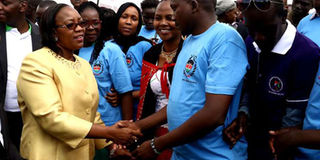Engage in moral action for youths, institutions, policies and practices

Public Service, Youth and Gender Affairs CS Sicily Kariuki (left) with members of youth groups at the International Youth Day celebration at Afraha Stadium in Nakuru on August 12, 2016. PHOTO | SULEIMAN MBATIAH | NATION MEDIA GROUP
What you need to know:
Nurturing young people is the responsibility of village elders and anchor institutions, including families, schools, congregations, and community organisations.
In ongoing political realignments, we must not forget reform agenda that was clearly articulated in aftermath of the post-election violence of 2007-2008.
As Kenyans, we are all caught – in Dr Martin Luther King Jnr’s immortal words – within “the garment of destiny”.
However, complicating this interdependence are the realities of ethnic political mobilisation, economic inequality, corrosive poverty, and vicious violence that is now commonplace in our society.
Beyond the ostentatious reconfigurations of political parties and fundraising dinners, therefore, we must again consider the question of moral leadership and how we can be part of it in our own small ways.
In the prevailing silly season of heightened political activity, political parties are changing each day as self-seeking actors shamelessly seek to jump ship and join new convenient political outfits.
We have witnessed the pomp and colour that has accompanied carefully choreographed political performances, some reportedly costing Sh300 million in a country where the vast majority eke out a living under dehumanising poverty.
Taken together, these developments in the political arena and society at large have exposed the danger of a society wanting for moral leadership that espouses a vision of interdependence and a narrative of equal justice for all.
Not that we do not have a vision. From the reports of the Akiwumi, Ndung’u, Kriegler, and Truth, Justice and Reconciliation commissions, Kenya continues to suffer from what we might call the “curse of the unattended narrative”. We have in all these and more, sadly, great stories that we have stopped telling and learning from.
MORAL ACTION
I see two possible zones of moral action that Kenyans of goodwill must engage in simultaneously. First is the urgency of providing care, discipline, and value-based education for our young people.
Nurturing young people is the responsibility of village elders and anchor institutions, including families, schools, congregations, and community organisations.
The great Harvard University development psychologist, Erik Erickson, argued that as elders enter the latter phases of life, their purpose and great opportunity is to prepare the next generation for the world and – I might add – prepare the world for the next generation.
A resocialisation process might entail enabling the youth to grapple with perceived privilege and the myths of supremacy, a benefit not requested or earned, but merely conferred through socialisation and codes with deep roots in an ethnic past.
We must enable the youth to know this history, know their location in that narrative and, most importantly, know they can transcend and transform the narrative.
There might be a need to encourage them to engage in persistent acts of subversion, ethnic disloyalty, and find the moral courage to stand in solidarity with the least advantaged members of the community.
We must enable our young people to know how to live together in a diverse world, their responsibilities as well as their rights, the art of civility and manners, work, love, forgiveness, and reconciliation.
FILL VOID
If village elders do not fill the void, village idiots certainly will.
Secondly, we should commit ourselves to the demanding work of re-engineering our institutions, policies, and practices through multiethnic, interfaith coalition-building for the common good.
In the ongoing political realignments, we must not forget the reform agenda that was clearly articulated in the aftermath of the post-election violence of 2007-2008.
Strong coalitions may be made of a small number of people who serve the common good, given our increasing tendency to play safe on the pressing issues of our times.
There is a need to focus on transforming institutions in Kenya – the State, the market, civil society, academic institutions, and the faith community. The critical point is ensuring greater inclusiveness and equity in our institutions.
Those who have been excluded or are barely visible – for whatever reason – must be welcomed at the table.
Joseph Wandera is an Anglican priest and senior lecturer at St. Paul’s University.





